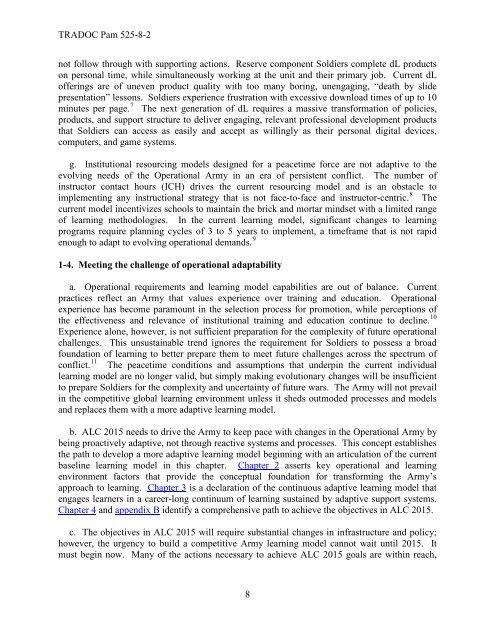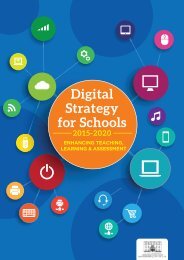K3zgZ
K3zgZ
K3zgZ
You also want an ePaper? Increase the reach of your titles
YUMPU automatically turns print PDFs into web optimized ePapers that Google loves.
TRADOC Pam 525-8-2<br />
not follow through with supporting actions. Reserve component Soldiers complete dL products<br />
on personal time, while simultaneously working at the unit and their primary job. Current dL<br />
offerings are of uneven product quality with too many boring, unengaging, “death by slide<br />
presentation” lessons. Soldiers experience frustration with excessive download times of up to 10<br />
minutes per page. 7 The next generation of dL requires a massive transformation of policies,<br />
products, and support structure to deliver engaging, relevant professional development products<br />
that Soldiers can access as easily and accept as willingly as their personal digital devices,<br />
computers, and game systems.<br />
g. Institutional resourcing models designed for a peacetime force are not adaptive to the<br />
evolving needs of the Operational Army in an era of persistent conflict. The number of<br />
instructor contact hours (ICH) drives the current resourcing model and is an obstacle to<br />
implementing any instructional strategy that is not face-to-face and instructor-centric. 8 The<br />
current model incentivizes schools to maintain the brick and mortar mindset with a limited range<br />
of learning methodologies. In the current learning model, significant changes to learning<br />
programs require planning cycles of 3 to 5 years to implement, a timeframe that is not rapid<br />
enough to adapt to evolving operational demands. 9<br />
1-4. Meeting the challenge of operational adaptability<br />
a. Operational requirements and learning model capabilities are out of balance. Current<br />
practices reflect an Army that values experience over training and education. Operational<br />
experience has become paramount in the selection process for promotion, while perceptions of<br />
the effectiveness and relevance of institutional training and education continue to decline. 10<br />
Experience alone, however, is not sufficient preparation for the complexity of future operational<br />
challenges. This unsustainable trend ignores the requirement for Soldiers to possess a broad<br />
foundation of learning to better prepare them to meet future challenges across the spectrum of<br />
conflict. 11 The peacetime conditions and assumptions that underpin the current individual<br />
learning model are no longer valid, but simply making evolutionary changes will be insufficient<br />
to prepare Soldiers for the complexity and uncertainty of future wars. The Army will not prevail<br />
in the competitive global learning environment unless it sheds outmoded processes and models<br />
and replaces them with a more adaptive learning model.<br />
b. ALC 2015 needs to drive the Army to keep pace with changes in the Operational Army by<br />
being proactively adaptive, not through reactive systems and processes. This concept establishes<br />
the path to develop a more adaptive learning model beginning with an articulation of the current<br />
baseline learning model in this chapter. Chapter 2 asserts key operational and learning<br />
environment factors that provide the conceptual foundation for transforming the Army’s<br />
approach to learning. Chapter 3 is a declaration of the continuous adaptive learning model that<br />
engages learners in a career-long continuum of learning sustained by adaptive support systems.<br />
Chapter 4 and appendix B identify a comprehensive path to achieve the objectives in ALC 2015.<br />
c. The objectives in ALC 2015 will require substantial changes in infrastructure and policy;<br />
however, the urgency to build a competitive Army learning model cannot wait until 2015. It<br />
must begin now. Many of the actions necessary to achieve ALC 2015 goals are within reach,<br />
8




